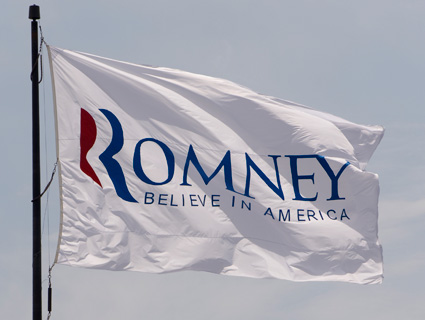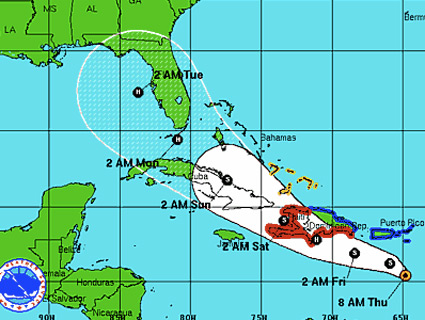Romney’s Speech: The Softer Side of a Hard-Right Campaign
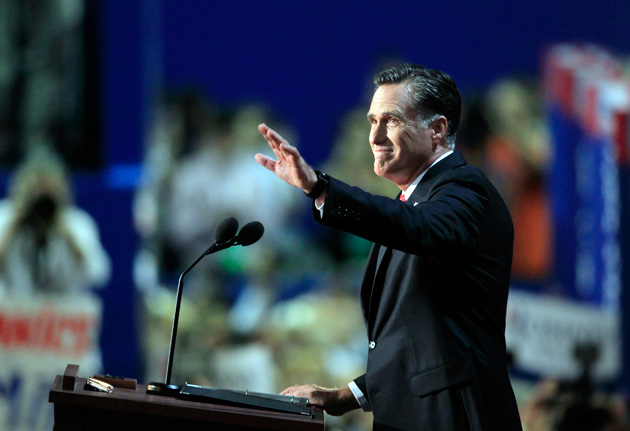 With the Republican convention in Tampa, Mitt Romney has launched the most ideological presidential campaign in recent history. At issue is not merely the current state of the economy and Romney’s ability to become the CEO-in-chief and perform a turnaround. Romney is waging a battle for the opportunity to conduct a conservative social experiment that would remake fundamentals of American society. But he neglected to mention that Thursday night during his climactic—though hardly soaring—acceptance speech.
With the Republican convention in Tampa, Mitt Romney has launched the most ideological presidential campaign in recent history. At issue is not merely the current state of the economy and Romney’s ability to become the CEO-in-chief and perform a turnaround. Romney is waging a battle for the opportunity to conduct a conservative social experiment that would remake fundamentals of American society. But he neglected to mention that Thursday night during his climactic—though hardly soaring—acceptance speech.
The previous evening, his veep pick Paul Ryan, when he wasn’t tossing out profoundly false talking points, married two ideas together: The first is that Romney is a successful businessman who can revive the flagging economy and return the nation to greatness. The second is that voters are now living in an American gulag, where basic freedoms have been destroyed and sanctimonious central planners dictate citizens’ lives, smother initiative, and doom everyone to a life of entitlements and control. The first of these notions is upbeat and hopeful, addressing the immediate concerns of voters confronting economic challenges: Romney, the guy who looks like a president from central casting, is galloping in on a white horse to rescue you. The other is gloomy and of more concern to the arch-libertarians of the tea party and conservative movement: We are living in a place akin to the former East Germany and must break free of the chains.
VIDEO: Clint Eastwood’s Bizarre “Empty Chair Obama” Speech at the GOP Convention (With Full Transcript)
On Thursday night, Clint Eastwood, the Academy Award-winning actor, director, and screenwriter, delivered one of the most bizarre political convention speeches in American history.
Speaking without prepared remarks, Eastwood carried on an imaginary conversation with an invisible President Obama seated in a chair next to him on the convention stage. I can’t even begin to try to summarize Eastwood’s rambling address to a bewildered audience and press corps. Rep. Paul Ryan (R-Wisc.), Mitt Romney’s vice presidential pick, looked less than pleased with Eastwood’s speech. And the Hollywood star’s invisible Obama skit quickly spawned its own Twitter feed—@InvisibleObama—and a satirical 2012 presidential bid. As well as #eastwooding.
Behold, Eastwood/Chair 2012:
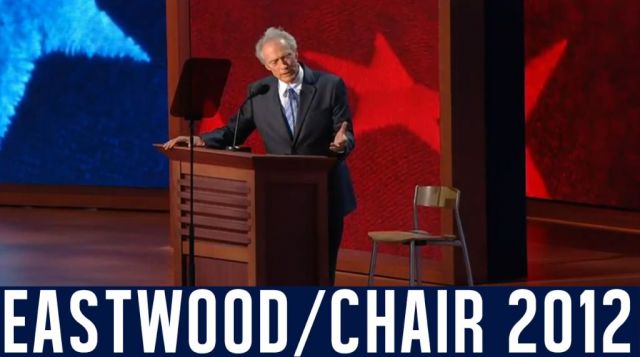 Twitter user @zdroberts
Twitter user @zdroberts
Corn on “Hardball”: Was Clint Eastwood’s Speech Political Comedy?
David Corn and Comedy Central’s Jared Logan and Mary Phillips-Sandy joined host Chris Matthews on MSNBC’s Hardball to parse the bizareness that was Clint Eastwood’s speech at the Republican national convention.
Inside the RNC’s Poshest Pit Stop: The Adelson Lounge
For campaign-trail veterans, one of the most important things at every convention—along with booze—is figuring out which pop-up lounges you should hit up to charge your batteries, swill some coffee, and grab a (preferably free) bite. Huffington Post has the “Oasis,” featuring unpaid massage therapists. CNG, the natural gas giant, has sofas and cafe con leche at the press filing center. Google’s lounge, replete with wireless and a gratis coffee bar, has basically been MoJo‘s Tampa bureau for the last five days. But the award for Most Posh Convention Hotspot of 2012 has to go to the Miriam Adelson Young Guns Pavilion, named for one half of the GOP’s dark money power couple and sponsored by House Majority Leader Eric Cantor’s Young Guns Action Fund. (It is probably not a coincidence that the Adelsons gave YGAF $5 million this year.)
As you can see, it’s really pink. When I stopped by on Tuesday, volunteers walked through the seating area offering everyone (almost everyone) free hair and makeup. The WiFi is free, the air extra-cool, and the “Woman Up-Tinis” are made special to order. Here’s a quick tour:
 The bar.
The bar.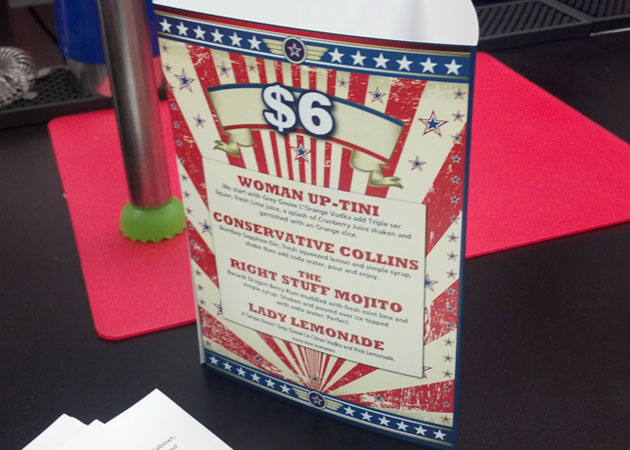 Lady Lemonade.[Read more]
Lady Lemonade.[Read more]
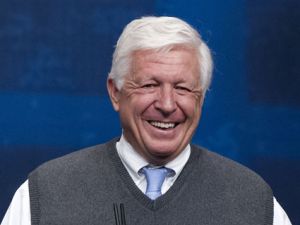 GOP Megadonor Foster Friess on RNC: “This Is a Nightmare For Me”
GOP Megadonor Foster Friess on RNC: “This Is a Nightmare For Me”
When Foster Friess began to cry, Condoleezza Rice was in the last throes of her speech at the Republican National Convention on Wednesday. The trigger was a tale about her childhood in segregated Alabama. “You might not be able to control your circumstances, but you can control your response to your circumstances,” he told me a few minutes later. “I love it.”
The GOP convention has been a magnet for the conservative megadonors—David Koch (an at-large delegate representing New York), Harold Hamm, Sheldon Adelson—who have helped redefine the campaign finance landscape in the 2012 cycle. But Friess, the Wyoming investor who last spring almost single-handedly kept Rick Santorum’s presidential campaign alive with $1.7 million in super-PAC donations, was ready to go home.
“This is a nightmare for me,” he said when I spotted him standing alone against a wall on the floor of the Tampa Bay Times Forum. “It’s too many things going on. I’ve got like four things to go to. It’s just so frustrating.” And while he loved Rice’s address, he was not sure how much more RNC speechifying he could take. “I’ve had enough speeches!”
With Ryan Speech, Romney Campaign Goes Full Tea Party
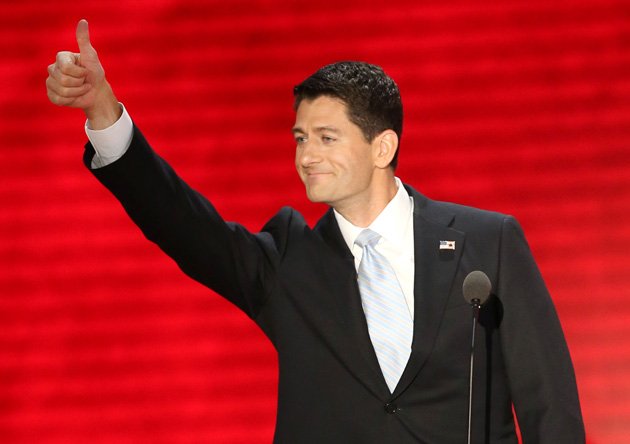 If there is a bedrock of conventional wisdom in presidential politics, it is this: First, succeed in the primaries by winning over the base, and then move to the center in the general election to court independent and middle-of-the-road voters. So where is Mitt Romney’s pivot to the center?
If there is a bedrock of conventional wisdom in presidential politics, it is this: First, succeed in the primaries by winning over the base, and then move to the center in the general election to court independent and middle-of-the-road voters. So where is Mitt Romney’s pivot to the center?
Throughout his political career, Romney has demonstrated a high degree of flexibility. But he has yet to employ those skills as the final stage of this presidential slog begins. And with Rep. Paul Ryan’s fiery speech at the GOP convention on Wednesday night, it was clear that Romney did not pick Ryan to appeal to the undecideds in the middle. The speech was an indication that the Romney crew has gone rogue—or completely tea party.
Speaking with poise and brimming with cocky confidence, Ryan took the predictable shots, deriding the stimulus and Obamacare. He devoted a long riff to the unfounded Romney charge that President Obama cut $716 billion from Medicare. He blasted Obama for not being serious about deficit reduction, going as far as to chide Obama for not fully embracing the bipartisan Simpson-Bowles deficit reduction plan that Ryan and other Republicans refused to support (because it called for modest tax hikes on the well-to-do). Before the pumped-up crowd of GOP delegates, Ryan blamed the closure of a GM plant in his hometown of Janesville, Wisconsin, on Obama’s policies—though the factory was shuttered before Obama became president. He did not refer to the successful auto industry bailout.
On Medicare, Ryan repeated the familiar GOP whine that Democrats are demagogues when they assail Ryan’s budget plan for ending the Medicare guarantee. “We want this debate,” he proclaimed. “We will win this debate.”
David Koch: Just One of the Guys at The GOP Convention
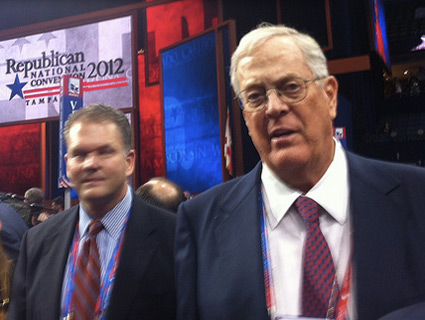 Via Dave WeigelDavid Koch, one-half of the hugely influential Koch brothers duo, was not hard to miss on the floor of the Republican National Convention. A former collegiate basketball player at M.I.T., Koch stands six-foot-five, a giant among the party faithful. He looks identical in person to the hundreds of photos of him just a Google search away. Koch is one of New York’s 95 delegates, all Romney supporters, and his presence here at the GOP convention has caused a stir. Koch’s private dinner with Sen. Ron Johnson (R-Wisc.) on Monday night ended up plastered all over Twitter, breeding rumors and speculation about who else dined with the man the liberal blogosphere loves to hate.
Via Dave WeigelDavid Koch, one-half of the hugely influential Koch brothers duo, was not hard to miss on the floor of the Republican National Convention. A former collegiate basketball player at M.I.T., Koch stands six-foot-five, a giant among the party faithful. He looks identical in person to the hundreds of photos of him just a Google search away. Koch is one of New York’s 95 delegates, all Romney supporters, and his presence here at the GOP convention has caused a stir. Koch’s private dinner with Sen. Ron Johnson (R-Wisc.) on Monday night ended up plastered all over Twitter, breeding rumors and speculation about who else dined with the man the liberal blogosphere loves to hate.
Koch—who with his brother, Charles, and their extensive donor network, reportedly plans to direct some $400 million toward defeating President Obama in November—doesn’t want the attention, and has tried to maintain a low profile in Tampa. I spotted him Tuesday afternoon on the convention floor looming over the rest of the crowd. He wore a navy suit, red-and-blue checkered tie, and a couple of fancy-looking convention passes sure to open doors that we reporters couldn’t dream of entering. I chatted with Koch’s three aides, and their messages were the same: No interviews, please. Mr. Koch wants to blend in, be just another delegate. One aide handed me and a few other reporters a printed-out statement with Koch Industries’ logo. Here’s what it said:
I’m deeply honored and humbled to be chosen as one of 95 delegates representing the great state of New York at the 2012 Republican National Convention.
Americans, we all have a role to play in the Democratic process. From learning about the issues to participating in campaigns and voting, this is an opportunity—and a right—to help chart the course of the nation.
The 2012 may be the most important of our lifetimes. Profoundly different political philosophies are competing for our hearts and minds—and our votes. I have made no secret about which philosophy I support—the one that provides the greatest economic and personal freedom possible.
Tuesday, Aug. 28, 3:00 pm EDT: The floor convention is underway, and our tweeting team has spotted some trends.
Mitt Romney says Tuesday night’s all right for fightin’:
Okay! twitter.com/timothypmurphy…
— Tim Murphy (@timothypmurphy) August 28, 2012
Some GOP top dogs seem a little behind the times:
Asked Cornyn about Tom Smith’s comments re: rape + unwed pregnancy. Said he “hadn’t followed it.” He’s chair of the NRSC!
— NickBaumann (@NickBaumann) August 28, 2012
And the Republican party is trying to make lemonade out of its talking points:
RNC chair
@reince Priebus: Obama doesn’t know about building a business. He “hasn’t seen in the inside of a lemonade stand!”#GOP2012— Andy Kroll (@AndrewKroll) August 28, 2012
That line of attack isn’t especially new:
RT
@newsninja2012: Sununu: Americans Suffering From “Incompetence Of A President Who Can’t Run A Lemonade Stand” fb.me/1UxCnJ9YD— gailtalk (@gailtalk) July 17, 2012
Nor, apparently, is it popular:
Really, you make me look bad as a republican. Stop talking about broken kitchen pipes and lemonade stands. You look racist and I look stupid
— andrew mahoney (@andrewmhn20) August 28, 2012
Tweets from Day Two of the convention:
Jon Voight just now, to reporter: “Are you Jewish?”
— Tim Murphy (@timothypmurphy) August 28, 2012
“Are you Jewish, Karen?” Jon Voight asks reporter named Karen Rubin. “I like the Jewish people.”
— Matt Viser (@mviser) August 28, 2012
The
@realdonaldtrump actually said this. Good things GOP invited him to their convention: twitter.com/JeremyStahl/st…— Jeremy Stahl (@JeremyStahl) August 28, 2012
#BROTUS MT@danielschulman: Spotted in contraband seized by conv ctr security in Tampa: sixer of Smirnoff Ice.— Tim Murphy (@timothypmurphy) August 28, 2012
That’s
@thehermancain cutting me in line on way into convention ctr. He was in hurry & vry nice about it tho lockerz.com/s/239179069— Daniel Schulman (@DanielSchulman) August 28, 2012
Romney aide Ashley O’Connor: “Our most effective ad is our welfare ad” because of “new information”
— Ben Smith (@BuzzFeedBen) August 28, 2012
Romney adviser Ron Kaufman at NJ events says welfare ads “have nothing to do with race.”
— Beth Reinhard (@bethreinhard) August 28, 2012
Romney pollster Neil Newhouse: “We’re not going to let our campaign be dictated by fact checckers.”
— Ben Smith (@BuzzFeedBen) August 28, 2012
Some serious shredding … at 1030 am … during the sound check here at the GOP convention arena:
#GOP2012 twitter.com/AndrewKroll/st…— Andy Kroll (@AndrewKroll) August 28, 2012
Opening Night in Tampa: Love or Respect for Romney?
Is the 2012 election about love, or is it about respect? At the first night of Mittfest in Tampa, there was some confusion on this point. After hours of predictable Obama-hates-freedom-and-business speeches, the evening culminated in back-to-back addresses by Ann Romney, Mitt Romney’s emissary to the human race, and Chris Christie, the take-no-guff Jersey guv.
The candidate’s wife opened this way: “I want to talk to you tonight not about politics and not about party…Tonight I want to talk to you about love.” Naturally, it was the love she had for a guy she met at a dance many years ago and the love all Americans have for their homeland. But she quickly digressed to tell the delegates—and the national television audience—that Ann Romney knows darn-tootin’ well that many Americans have it tough these days, especially women. And she played the gal card: “If you listen carefully, you’ll hear the women sighing a little bit more than the men. It’s how it is, isn’t it? It’s the moms who always have to work a little harder, to make everything right. It’s the moms of this nation—single, married, widowed—who really hold this country together…You know it’s true, don’t you? You’re the ones who always have to do a little more.”
Here was the play for the female vote—a response to the Democratic charge of a Republican war on women. But was she engaging in Gender Warfare? Dividing the nation into moms and dads in order to score political points?
If not, this was the political equivalent of sending flowers to the little lady in hope of winning her over. And it was condescending. Speaking to the moms of the country, she said, “There would not be an America without you.” As if such a platitude would have real value to them. And referring to all women, she added, “We’re too smart to know there aren’t easy answers. But we’re not dumb enough to accept that there aren’t better answers.” Wait a minute: Who says women are dumb? What was she suggesting?
“Fuck You, Tyrants!”: Ron Paul Supporters Rebel on Convention Floor
—Andy Kroll and David Corn
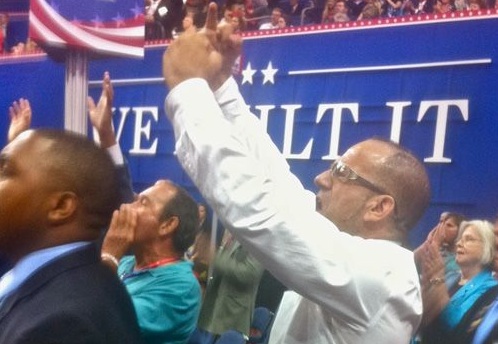 A minor revolt broke out on the floor of the Republican Party’s presidential convention Tuesday afternoon and evening. Ron Paul delegates from several states erupted into protest over a controversial change to the party’s rules to block future insurgencies mounted by outside candidates like their hero. Paul supporters also freaked out over the convention’s refusal to recognize about two dozen Paul delegates and for refusing to treat Paul like a serious candidate for the nomination.
A minor revolt broke out on the floor of the Republican Party’s presidential convention Tuesday afternoon and evening. Ron Paul delegates from several states erupted into protest over a controversial change to the party’s rules to block future insurgencies mounted by outside candidates like their hero. Paul supporters also freaked out over the convention’s refusal to recognize about two dozen Paul delegates and for refusing to treat Paul like a serious candidate for the nomination.
During the roll call of the states, the Paulites were irate, screaming at the podium, as convention secretary Kim Reynolds declined to read out the delegate votes for any candidate other than Romney. “The Republican Party is so afraid of Ron Paul that they won’t repeat his name,” shouted Jim Ayala, a Nevada delegate and Paul supporter wearing an Oath Keepers T-shirt.
Minutes earlier, the Paulites were enraged when the convention adopted the new set of rules on a voice vote during which the Paul backers out-shouted the other delegates. One Nevada delegate and Paul supporter, Mark Carducci, thrust two middle fingers into the air toward RNC Chairman Reince Priebus and House Speaker John Boehner (R-Ohio), screaming “Fuck you, tyrants!”
Guy in Charge of Electing GOP Senators Hasn’t Been Following Pennsylvania Senate Race
 Gage Skidmore/FlickrIt seems that Sen. John Cornyn (R-Texas) doesn’t read much news.
Gage Skidmore/FlickrIt seems that Sen. John Cornyn (R-Texas) doesn’t read much news.
On Tuesday afternoon at the Republican National Convention, I asked Cornyn what he thought of the controversy surrounding Pennsylvania Senate candidate Tom Smith, who compared being an unwed mother to being raped. I was wondering whether Cornyn thought Smith’s comments (which drew national headlines before his spokeswoman walked them back) might reduce the GOP’s chances of winning the seat. Cornyn is the chair of the National Republican Senatorial Committee (NRSC), which is charged with electing GOP senators, but he told me he “honestly hadn’t followed” the Smith controversy.
There are only a few possible explanations for this. Assuming Cornyn was telling the truth, and the NRSC is remotely competent, it suggests that the NRSC doesn’t think Smith has much of a chance of unseating Democratic incumbent Robert Casey Jr., who leads in the polls. If NRSC staff thought the race was competitive, they would have been monitoring it and would have alerted their boss when the GOP candidate made a deeply damaging, headline-grabbing gaffe. The fact that Cornyn seemed not to have heard of the controversy suggests his staff may think it doesn’t matter.
Via Anthony DeRosa of Reuters, here’s some swag from Moms for Romney/Ryan at the RNC. Contrary to what you may have read, Republicans have no problem with women! As long as their uteruses are in good working condition. And know their place:
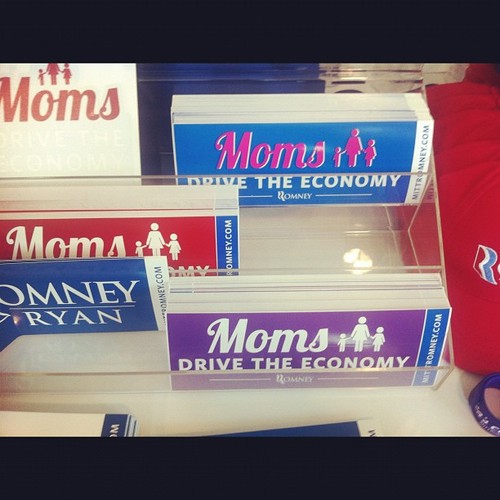 Moms drive the economy. (Unless they’re single moms!) Anthony DeRosa/Reuters
Moms drive the economy. (Unless they’re single moms!) Anthony DeRosa/Reuters
GOP Platform Calls for Nuking What’s Left of McCain-Feingold Law
 At this time during the last presidential campaign, the Republican Party’s campaign finance law opponents were in something of a pickle. Sen. John McCain (R-Ariz.) was their nominee; the tough law banning so-called soft money bore his name; and so, during the 2008 election, the GOP platform couldn’t take a rhetorical buzzsaw to the laws curbing the flow of campaign cash into elections.
At this time during the last presidential campaign, the Republican Party’s campaign finance law opponents were in something of a pickle. Sen. John McCain (R-Ariz.) was their nominee; the tough law banning so-called soft money bore his name; and so, during the 2008 election, the GOP platform couldn’t take a rhetorical buzzsaw to the laws curbing the flow of campaign cash into elections.
There’s no such problem for Republicans at the 2012 GOP convention. James Bopp, Jr., an influential lawyer who’s made a career out of demolishing campaign finance laws, said in a recent interview with the Indianapolis Star that the GOP’s 2012 platform will call for gutting what’s left of the McCain-Feingold law—namely, the ban on unlimited, unregulated, soft money given to political parties.
The platform, Bopp suggests, will read like a wish list for haters of campaign finance restriction:
Four years ago, he watched with distaste as his party nominated Sen. John McCain as its presidential nominee. With McCain leading the ticket, Bopp said, “we couldn’t write in (the platform) that we opposed McCain-Feingold. And we sure as hell couldn’t endorse it, so we didn’t say anything about campaign finance.”
This time, he said, the platform calls for the repeal of the last vestiges of the McCain-Feingold law and opposes passage of the so-called “Disclose Act” in Congress. It would require advocacy groups making more than $10,000 in campaign-related expenditures to disclose contributors who had donated more than $10,000.
What Democrats call basic good government, Bopp sees as an attempt to stifle advocacy groups by making them report donors for ads that run as far as 18 months before an election.
Josh Orton, political director at Progressives United, the nonprofit founded by former Sen. Russ Feingold (D-Wisc.) to fight the influence of corporations in politics, blasted the GOP’s campaign finance plank. “McCain-Feingold closed the door on a corrupting system of unlimited money,” Orton says. “By advocating its repeal, Republicans are proving that they don’t just tolerate corruption in politics, they actually embrace it.”
EXCLUSIVE VIDEO: Herman Cain Goes Off: “There are No Racial Implications” to Romney Welfare Ad!
Herman Cain doesn’t see what the big deal is about a roundly debunked Republican claim about President Obama and welfare. The charge, parroted in GOP talking points and a new Romney campaign ad (which a Romney strategist said Tuesday was the campaign’s most effective one yet), is that President Obama issued an exemption allowing states to water-down the work requirements to receive welfare benefits. (The exemption, requested by Republican governors, actually did the opposite. It allowed states to adjust their work requirements, giving them the ability to make it harder to receive welfare benefits.)
The racial overtones of the welfare charge are not especially subtle (Newt Gingrich was accused of treading into equally racially tinged terrain by calling Obama a “food stamp president” during the primary). With that in mind, I asked one of the GOP’s most prominent African American voices, former presidential front-runner Herman Cain, if he was troubled by the welfare ad. Answer: Hell no. Cain’s aide said he was in a hurry to get inside the Tampa convention center, but when he heard my question he told his handlers to stop:
There are no racial implications! This is fabricated on the part of the Democrats. Man, I’m just sick of all this so-called racial implications. It is a fair ad that Gov. Romney put out about welfare. And for the Democrats to continue to talk about racial implications, they are just trying to deceive people! I’m sick of it! There is only one color that matters in the American dream and that’s green! And by the way, there are poor black people and poor white people, and poor Hispanics, so there are no racial implications. Thank you, I had to stop for that.
Tampa 2012: The Birthers Cometh (With Video)
David Lipinoga, a Republican town committeeman from Amherst, New York, isn’t a delegate at the Republic National Convention. He’s here to sell stuff—specifically, an Angry Birds-style Android game called “Angry Patriots and Pinheads” that’s designed to educate users on the radicalism of President Obama. Here, you can even watch a demo. But, as I found out when I talked to him on Monday outside the press filing center in Tampa, he’s also got some…interesting thoughts about President Obama’s real name, Social Security number, and place of birth:
One more example why Mitt Romney’s birther joke in Michigan last Friday was almost certainly not a gaffe; plenty of conservatives still believe this stuff and Romney wants their votes.
Music by Mike Smirnoff.
Does GOP Senate Candidate Josh Mandel Think Paul Ryan Is “Un-American”?
Josh Mandel is the boyish-faced, factually-challenged Republican candidate vying to unseat Sen. Sherrod Brown (D-Ohio). Until last weekend, Mandel had refused to stake out a clear position on what had become a key issue in this Rust Belt race: whether Congress was right to rescue auto manufacturers General Motors and Chrysler with a $15 billion federal bailout. It was a glaring omission for Mandel, a national candidate in a battleground state where the automotive industry employs upwards of 140,000 Ohioans.
In a joint interview with Brown on Sunday, however, Mandel broke his silence in a big way. He called Brown “un-American” for voting in favor of the auto industry bailout, claiming that non-union retirees at Delphi, a GM parts supplier, got screwed out of of their pensions because of the government bailouts. (As PolitiFact notes, that’s not quite true.)
There’s a big problem with branding a yes vote on the auto bailout “un-American”: The presumptive vice-presidential nominee for Mandel’s own party, Rep. Paul Ryan (R-Wisc.), voted yes for that same bailout. Is Ryan un-American, too?
I put that question to Mandel spokesman Travis Considine in an email early Tuesday morning. Considine has yet to reply; we’ll update this post if he does.
Ryan was one of 32 House Republicans to vote for the auto bailout on December 10, 2008, vastly outnumbered by the 150 House GOPers who voted against it. Then-Sen. George Voinovich (R-Ohio), in Congress’ upper chamber, also voted in support of the auto bailout; he was joined by seven other Senate Republicans. Is Voinovich also un-American, according to Mandel?
Mitt Romney has a more complicated record on the auto bailout. In November 2008, he wrote an op-ed titled “Let Detroit Go Bankrupt.” He argued then that rescuing the auto companies would only lead to their demise further down the road. (He was wrong.) Later, Romney tried to claim credit for the auto industry’s rebound, despite his insistence that the bailouts would ruin the companies.
Brown, who was present when Mandel called him un-American, declined to respond directly to the charge. Here’s the full exchange between Brown and Mandel, as reported by the Columbus Dispatch:
“I don’t toss around the word un-American very often—it’s a dangerous word to use. But stripping…Delphi employees of their pensions with that [bailout] vote—that is un-American,” Mandel said during a sit-down with Brown and editors and reporters of the Dispatch.
“While Josh was running for treasurer in 2009 and 2010, I guess he missed how this auto industry was going to implode,” Brown replied. “And to say that my votes closed plants or that my votes caused Delphi workers to lose their pensions or that my votes caused other tragedies and devastations in the auto industry is peculiar when all four auto companies in Ohio and almost the entire supply chain…wanted this because they knew the auto industry might implode.”
Brown didn’t say anything about the “un-American” label, but one of his campaign aides later said it was disrespectful.
Ohio Democratic Party spokesman Andrew Zucker responded to Mandel’s “un-American” charge, saying that “Josh Mandel’s opposition to the auto rescue that helped to protect nearly 850,000 Ohio jobs is wildly out of touch with Ohio’s middle class, and that’s why he’s resorted to a despicable personal attack on Sherrod Brown that has no place in our political discourse.”
Gingrich: I’d Recommend Pro-Gold Activists for Romney Gold Commission
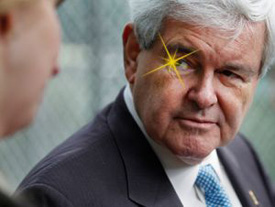
Ron Paul must be thrilled: After over three decades years in the wilderness, the gold standard has returned to the Republican party platform. As Bloomberg reported on Friday, the draft GOP platform—the party’s road map for where it wants to lead the country—includes a call for a presidential commission to study pegging the value of the dollar to the price of gold. And even though the primary is long over, Paul is not the only top Republican still pushing for gold to have a big role in Mitt Romney’s presidency.
During the primary, Paul, a long proponent of what he calls “sound money,” and later Newt Gingrich, the former speaker of the House, embraced the idea of a gold commission. During the South Carolina primary, Gingrich said that he’d appoint Lewis Lehrman, a banker, and Jim Grant, a prominent investment adviser, to co-chair the gold commission. Both Lehrman and Grant (Paul’s pick to replace Ben Bernanke as chairman of the Federal Reserve) are prominent advocates of the gold standard.
Now that the commission he and Paul supported is part of the draft party platform, I asked Gingrich whether he still supported Lehrman and Grant’s appointments—and whether he’d push Mitt Romney to appoint them if elected president. “Yes,” he said. “I’d recommend them.” Romney himself has expressed skepticism about the gold standard, which he told CNBC’s Larry Kudlow in January is not a “magic bullet substitute for economic restraint.” He’d be free to ignore the GOP platform and Gingrich’s recommendations if elected president. But the inclusion of the commission proposal in the platform, and Gingrich’s willingness to press the issue, suggest that Romney will remain under some pressure from his right to at least acknowledge the concerns of gold proponents.
“The Best Thing About the Platform Is That Nobody Cares About the Platform”
 Former GOP presidential candidate and full-time Mitt Romney critic Fred Karger.If you don’t count Fred Karger, there was only one gay Republican candidate at the happy hour for gay Republican candidates on Monday at Oystercatchers, an upscale seafood joint in Tampa overlooking the St. Petersburg causeway. Nor, for that matter, in a city that’s swimming with Republican political heavyweights, were there any Republican political heavyweights in attendance. That’s not much of a surprise for a party whose draft platform sought to deny rights to gay families and tacitly endorsed the persecution of gays in Uganda and other African nations.
Former GOP presidential candidate and full-time Mitt Romney critic Fred Karger.If you don’t count Fred Karger, there was only one gay Republican candidate at the happy hour for gay Republican candidates on Monday at Oystercatchers, an upscale seafood joint in Tampa overlooking the St. Petersburg causeway. Nor, for that matter, in a city that’s swimming with Republican political heavyweights, were there any Republican political heavyweights in attendance. That’s not much of a surprise for a party whose draft platform sought to deny rights to gay families and tacitly endorsed the persecution of gays in Uganda and other African nations.
But Michael Carr, an Internet marketer who’s running for a state Senate seat in the Denver suburbs, isn’t particularly bothered by the GOP’s anti-gay platform. “The best thing about the platform is that nobody cares about the platform,” Carr says. A member of former Utah Gov. Jon Huntsman’s LGBT steering committee (Huntsman was the only GOP candidate with an LGBT steering committee), Carr is the guest of honor at the event, hosted by the Log Cabin Republicans. He’s convinced the best is yet to come—Republicans might even nominate a pro-gay marriage presidential candidate as early as 2016.
“Politicians are looking at the data,” Carr says. “We might have someone who’s on the national stage ‘evolve.'” Everyone I talk to at Oystercatchers uses that word, “evolve,” a nod to President Obama’s own shift on gay rights.
But Carr is being diplomatic. David Valkema (“It means ‘falcon’ in Dutch”), a Romney delegate from Indiana, is less so. His beef isn’t with the homophobic leaders of the Republican party, with whom he agrees with on almost everything else. It’s with gay liberals.
“I’m sick and tired of being a Jew for Hitler,” he says. “I’m like, ‘Where’s your tolerance? You accept everyone else under the sun except for us.'” Although a recent poll showed that 44 percent of Republicans in Wisconsin—a comparatively progressive state—say they’d never vote for an openly gay candidate, Valkema thinks Republicans are quietly shifting behind the scenes. Case in point: This summer he helped convince the Indiana GOP to scrap any mention of marriage from the its platform. It wasn’t an endorsement of marriage equality, but it wasn’t a chest-beating condemnation either.
Where’s Pat Buchanan?
One of the more infamous moments of recent presidential conventions occurred at the Republican gathering in Houston in 1992, when commentator Patrick Buchanan, who had unsuccessfully challenged President George H.W. Bush in the GOP primaries, took to the stage in prime time and delivered a thunderous address declaring the United States was in the midst of a “cultural war.” He was in full firebrand:
Friends, this election is about more than who gets what. It is about who we are. It is about what we believe and what we stand for as Americans. There is a religious war going on in this country. It is a cultural war, as critical to the kind of nation we shall be as the Cold War itself. For this war is for the soul of America. And in that struggle for the soul of America, Clinton & Clinton are on the other side, and George Bush is on our side. And so to the Buchanan Brigades out there, we have to come home and stand beside George Bush.
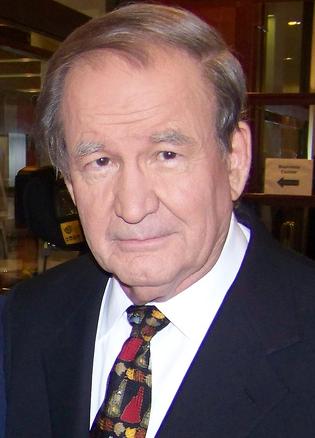 Bbsrock/Wikimedia CommonThe electrifying speech was a sensation…for the right. Many political commentators, though, considered it weighty baggage for the Bush-Quayle ticket, hurting Bush with moderate voters. Molly Ivins quipped, the speech “probably sounded better in the original German.”
Bbsrock/Wikimedia CommonThe electrifying speech was a sensation…for the right. Many political commentators, though, considered it weighty baggage for the Bush-Quayle ticket, hurting Bush with moderate voters. Molly Ivins quipped, the speech “probably sounded better in the original German.”
So with the Republican Party now skewed far to the right, is the hero of its culture-war troopers present in Tampa to rally once again the true believers? No, Pat Buchanan, who was recently dropped by MSNBC, is skipping the festivities. He is, instead, at the Delaware shore, toiling away on his latest book, according to his sister, Bay Buchanan, a prominent emissary to social conservatives for Mitt Romney.
Buchanan’s new work is on Richard Nixon, his one-time boss. And it could be a doozy of a book, for Buchanan has a trove of insider stories about the Old Man. Buchanan, who has hailed Nixon as a brilliant fellow, witnessed Nixon at his best and his worst, and, back in the day, Buchanan was always eager to suggest or implement political war plans for the Nixon White White. If he can produce a book that honestly confronts Nixon’s dark side, Buchanan might do a service for history. And he may be helping Romney by steering clear of Tampa.
Romney Backs Taxpayer-Funded Elections, Gives His Base a New Reason to Bitch
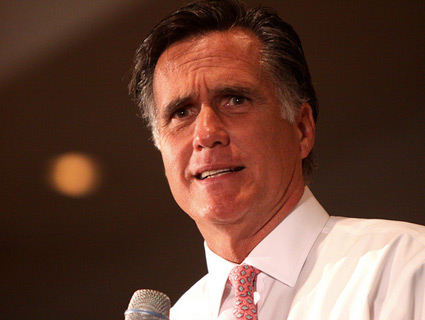 Gage Skidmore/Flickr
Gage Skidmore/Flickr
Mitt Romney just gave the Republican Party’s conservative base another reason to face-palm over their party’s presidential candidate. In an interview on Fox News Sunday, Romney said he “absolutely” supports returning to taxpayer-funded presidential elections if he wins in 2012 and runs for a second term in 2016. “To be competitive, we’re obviously following suit,” he said of his decision to forgo public financing, like the Obama campaign. “But I’d far rather have a setting where we had both agreed to the federal spending limits.”
It’s a strange statement for Romney to make, especially given his still-uneasy relationship with the Republican right. Conservatives, whom Romney needs to turn out in droves in key battleground states this fall, vehemently oppose taxpayers footing the bill for elections of any kind—local, state, or national. Conservative attorneys have made a career out of challenging and gutting public financing programs; recently they’ve scored wins doing just that in North Carolina and Arizona. One of the first acts of the current GOP’s House majority was a vote to repeal the federal public financing system. (The Democrat-controlled Senate did not follow suit.)
First conceived in the wake of the scandals of the 1974 presidential election, publicly-financed elections were seen as a way to wean candidates from the big checks and undue influence of private donors. Instead, a fixed amount of taxpayer money would be set aside for presidential candidates. Everyone from Ronald Reagan and George H.W. Bush to Jimmy Carter and Bill Clinton took public money for their presidential campaigns.
In 2008, Barack Obama sensed he could raise more money on his own, and so broke a previous pledge to accept public financing. He trounced McCain in the campaign money race, ultimately spending $730 million to McCain’s $333 million. This presidential campaign, it was never in doubt that Obama and Romney would reject public funds, teeing up the first general election since Watergate with neither candidate taking taxpayer money. Doing so would’ve capped the candidates’ campaign spending at $45.6 million during the primary season and $91.2 million in the general election. In contrast, the Obama campaign has spent $263 million and Romney team $163 million to date.
The Public Campaign Action Fund, a supporter of less unlimited money in elections, called on both candidates to offer plans to revamp the country’s outdated public financing system. “Both candidates like to talk about the influence of money on their opponent’s policies,” said David Donnelly, executive director of Public Campaign Action Fund, “but neither has offered a plan on how to address it.”
Romney and His Gang: “They’re Comfortable.”
In the mostly empty Tampa Bay Times Forum this morning, media professionals, politicos of D and R designations, and pundits are milling about, as the world waits breathlessly for the GOP convention to begin tomorrow. While strolling through the arena, I ran into a top Republican who has not been so keen on Mitt Romney and his campaign tactics over the past year. He believes the Romney campaign has failed to engage voters in a fundamental fashion—regarding either Romney’s biography or policy beliefs.
Do you expect anything major to change on the Romney side? I asked.
“No,” he said, a tone of sadness in his voice. “I talk to people in the campaign and they tell me they’re comfortable where they are now.”
Really? I followed up. Given the lousy economy and the polls showing doom-and-gloom among the electorate, shouldn’t Romney be 10 points ahead of the guy in the White House?
“Yes, but they think they’re in a good spot. And when you feel comfortable, you don’t change things.”
He rolled his eyes and added, “At least the weather is getting better.”
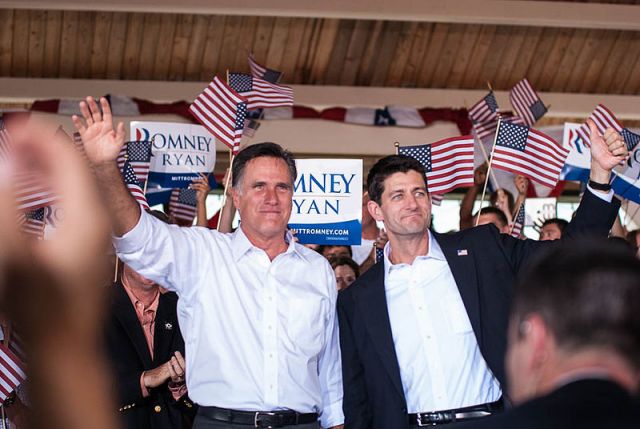 monkeyz_uncle/Flickr
monkeyz_uncle/Flickr
Draft GOP Platform Defends Anti-Gay Laws in Africa
 TUBS/Wikimedia CommonsAn early draft of the Republican platform published by Politico accuses the Obama administration of “attempting to impose” on the “peoples of Africa…legalized abortion and the homosexual rights agenda.” Since 2006, with the urging and influence of US conservative Christian groups, several African countries have considered or passed laws outlawing homosexuality. The most infamous of them, proposed in Uganda, would impose the death penalty for “aggravated homosexuality.” (Read Mac McClelland’s must-read, on-the-ground account from Uganda here.)
TUBS/Wikimedia CommonsAn early draft of the Republican platform published by Politico accuses the Obama administration of “attempting to impose” on the “peoples of Africa…legalized abortion and the homosexual rights agenda.” Since 2006, with the urging and influence of US conservative Christian groups, several African countries have considered or passed laws outlawing homosexuality. The most infamous of them, proposed in Uganda, would impose the death penalty for “aggravated homosexuality.” (Read Mac McClelland’s must-read, on-the-ground account from Uganda here.)
As for imposing the ambitious “homosexual rights agenda” of trying to prevent people from being murdered or imprisoned by the state for not being heterosexual, in December of 2011 Secretary of State Hillary Clinton gave a speech proclaiming that “gay rights are human rights, and human rights are gay rights.” Shortly afterward, President Obama issued a memo “directing all agencies engaged abroad to ensure that U.S. diplomacy and foreign assistance promote and protect the human rights of LGBT persons.” Texas Gov. Rick Perry, then seeking the Republican nomination for president, said: “This is just the most recent example of an administration at war with people of faith in this country,” and that “promoting special rights for gays in foreign countries is not in America’s interests and not worth a dime of taxpayers’ money.” In some circles, not being imprisoned or executed for your sexual orientation is apparently a “special right.”
The United States itself is less than a decade past the 2003 Supreme Court decision in Lawrence v. Texas that struck down laws that criminalized homosexuality. Make no mistake however: The language in this draft of the GOP platform protests the Obama administration’s efforts against laws that would levy criminal sanctions, including death, on people simply because of their sexual orientation.
A related point: The “human rights” section of the GOP platform is one small paragraph, perhaps the tiniest section other than the one devoted to “public diplomacy.” There are no harsh words for the administration in areas that have drawn international criticism, such as deaths of civilians in drone strikes. The section is focused on attacking the Obama administration for supposedly not standing up for “religious freedom,” and it refers only to the persecution of religious minorities in the Middle East and “fanaticism” in “West and East Africa.” As far as the GOP is concerned, “religious freedom” doesn’t extend to people who do not subscribe to the religious conviction that homosexuality is sinful and should be punished by the state.
Mitt Romney and GOP in Tampa: How Low Will They Go?
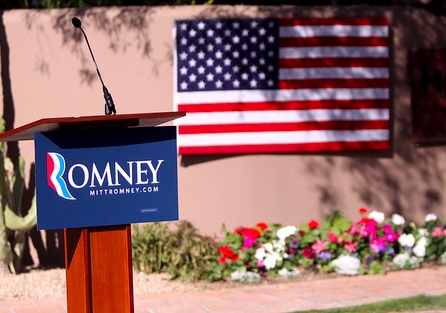 Gage Skidmore/FlickrWith Republicans flocking—or swimming—to hurricane-threatened Tampa for the very wet coronation of moderate-no-more Mitt Romney as the tea-partyized (and Paul Ryanized) leader of the GOP, only one question hovers over the proceedings: How far will they go? That is, in terms of nastiness, extremism, and fact-defiance.
Gage Skidmore/FlickrWith Republicans flocking—or swimming—to hurricane-threatened Tampa for the very wet coronation of moderate-no-more Mitt Romney as the tea-partyized (and Paul Ryanized) leader of the GOP, only one question hovers over the proceedings: How far will they go? That is, in terms of nastiness, extremism, and fact-defiance.
Every four years, it’s routine—and usually justifiable—to bemoan the presidential campaign of the moment as a gutter-swipe endeavor, fueled more by low-minded swill than high-end discourse. But Romney’s 2012 effort has managed to crawl along and leave plenty of space beneath the low bar, as the candidate, who once claimed to be a nonpartisan, progressive fellow distant from the radicals of his party, has deployed assaults against President Barack Obama that are tinged with racism and has countenanced attack ads that push the already much-stretched envelope of political truth-bending.
At this moment, as Romney and his confreres command a national audience, they are poised to build on a foundation of untruthfulness and Obama-hatred years in the making. The New York Times, in polite fashion, noted that Romney and his posse have decided to use this week to cast a harder edge on their message. Is that a signal that Romney’s whatever-it-takes approach will now be turned up to 11?
Tweets from Day One of the convention:
Does the stage at
#RNC2012 look like the altar at a mega-church? twitter.com/DavidCornDC/st…— David Corn (@DavidCornDC) August 27, 2012
I’m at the Forum. Waiting for make-up. Typing on empty tall garbage can. Rove passes & says, “You deserve a desk.”
#civility#RNC2012— David Corn (@DavidCornDC) August 27, 2012
Small crowd chanting “President Paul, President Paul” on convention floor. That’s not awkward, or anything.
#gop2012— Andy Kroll (@AndrewKroll) August 27, 2012
(Also only one gay Republican candidate at happy hour for gay Republican candidates. A candidate for Colorado state Sen.)
— Tim Murphy (@timothypmurphy) August 27, 2012
Food at gay GOP thing. twitter.com/timothypmurphy…
— Tim Murphy (@timothypmurphy) August 27, 2012
A Paul alt. delegate from Wyoming told me he thinks they canceled the first day of the convention to prevent being embarrassed by Paulites.
— Tim Murphy (@timothypmurphy) August 27, 2012
[Tweet about how ridiculously militarized Tampa is right now.] twitter.com/timothypmurphy…
— Tim Murphy (@timothypmurphy) August 27, 2012
Vermin Supreme meets the police. twitter.com/timothypmurphy…
— Tim Murphy (@timothypmurphy) August 27, 2012
